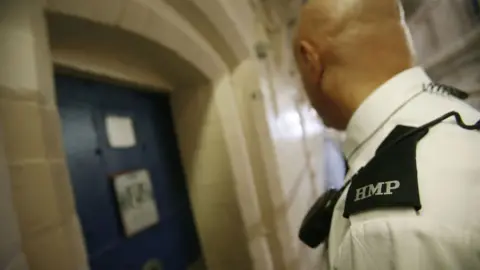 PA Media
PA MediaWith Scotland’s prison population approaching “crisis” point, the Scottish government has tabled plans to let more prisoners out early.
The Scottish Conservatives say victims are being “betrayed”.
Their leader, Russell Findlay, has also suggested that SNP ministers could free up space by doing more to remove foreign nationals from jails.
The Scottish government says that is a matter for the UK government – though it is “actively engaging” with Sir Keir Starmer’s government.
How overcrowded are Scotland’s prisons?
The target operating capacity of Scotland’s prisons is 8,007. As of 8 November, there were 8,273 inmates in jail.
Overcrowded prisons can be dangerous for inmates and staff, as well as harming the prospects of rehabilitation.
The problem is not isolated to Scotland, which along with England and Wales has a higher proportion of citizens in prison than most other countries in Europe.
Both north and south of the border, emergency measures have been used to let inmates out early – with mixed results.
 PA Media
PA MediaHundreds of Scotland’s prisoners were released early in June and July. By September, the number of inmates had climbed to 8, 241 – higher than it was before the emergency release began.
The government is now is hoping to pass emergency legislation that would allow between 260 and 390 prisoners to be freed early in February.
The new law would let people sentenced to less than four years be released after serving 40% of their sentence, rather than the current 50%.
How many foreign nationals are in Scotland’s prisons?
Figures show there were 629 foreign nationals in Scotland’s jails as of the beginning of October – about 7.6% of the prison population. Only about half, 325, had been convicted of a crime.
Findlay, speaking to BBC Radio’s Good Morning Scotland, acknowledged foreign nationals made up a small part of the prisoner population.
 PA Media
PA MediaBut he questioned what work the Scottish government was doing to identify foreign inmates, speaking to their countries of origin and exploring options to return them there to see out the remainder of their sentence.
He added: “Where’s the serious thinking being done about what other options are available instead of yet again arbitrarily opening the prison gates and releasing people who shouldn’t be released because they’re dangerous?”
Justice Secretary Angela Constance said that responsibility for deportations was reserved to Westminster, but that Scottish ministers were “actively engaging” with the UK government to identify ways to “increase the efficiency” of plans to reduce prison populations.
What are the rules for foreign inmates?
The UK Home Secretary has a legal duty to deport non-British, non-Irish nationals criminals sentenced to at least 12 months in jail, with certain exceptions.
There is also ministerial discretion to deport foreign nationals for lesser offences if it is “conducive to the public good”.
All foreign prisoners are referred to the Home Office to consider whether deportation is legally required, or appropriate if not required.
The UK Labour government has also said it is exploring ways to improve the effectiveness of a scheme that allows foreign nationals leave prisons in England and Wales before their sentence is finished.
Foreign offenders facing deportation can be a awarded a resettlement grant of up to £1,500 if they co-operate with the removal process.
Prisoners can be transferred to their home country to serve the balance of their sentence there, though this is less common.
Since 2010, the UK has transferred 945 foreign offenders to 50 countries and territories.
What is the solution?
The crisis facing Scotland’s prisons evidently extends well beyond a few hundred foreign inmates.
The Scottish government is hoping to pass its latest proposals into law by next week via an accelerated emergency bill in parliament.
Findlay says SNP ministers have failed to build new prisons, reform community sentencing and invest in technology, such as alcohol monitoring tags used in other parts of the UK.
Constance defended the government’s record, highlighting revamped community payback orders, electronic monitoring, home detention curfews and bail and release reforms.
She said while the government was seeking an “immediate” cut in prisoner numbers, it also needed a “sustained” reduction.
Fergus McNeill, professor of criminology at the University of Glasgow, told the BBC there was an urgent need for a reduction of inmates.
He said: “Prisons are so overcrowded that they are dangerous for people that live in them and for people that work in them, they’re ineffective in terms of rehabilitation and reintegration, and they’re wasting large amounts of public resources.”
Long-term, the criminologist said funds should be directed away from prisons and into communities and agencies that aid inmates once they are freed.
“What we should be doing is reducing the present population fairly dramatically in Scotland, so that we’re in line with other European countries, and at the same time moving money out so that we’re better equipped to support people in the community.”




